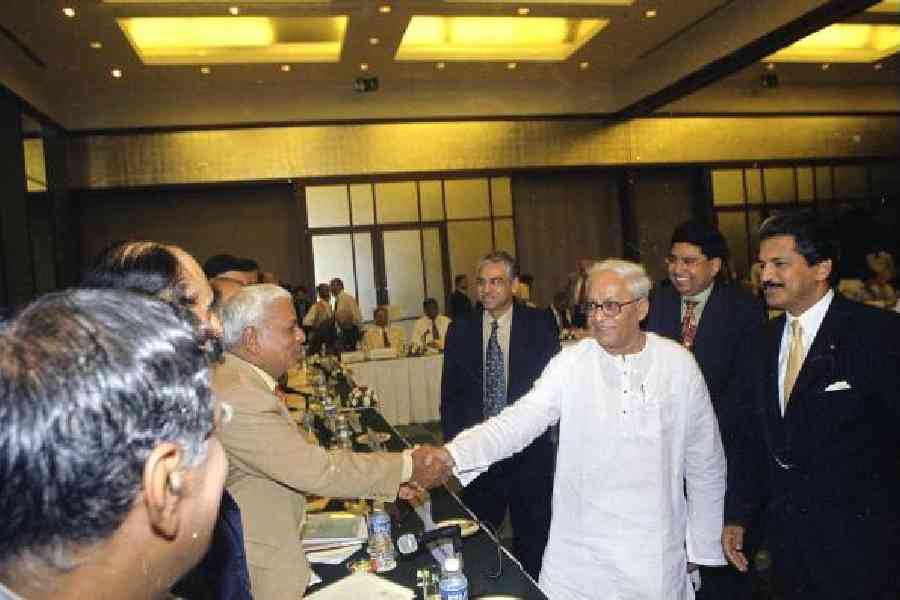The 70-minute interview, in a room on the first floor of the CPM’s Alimuddin Street office, had just ended on an April morning in 2014, ahead of the Lok Sabha polls.
Buddhadeb Bhattacharjee, who was the main campaigner for the party in the
impending elections, had spoken extensively on national issues like how the corporate sector was desperate to make Narendra Modi the next Prime Minister.
Some of his favourite international topics — from the relevance of an idea like Communist International (Comintern) to the US imperialist interest in the Persian Gulf — also came up during the interview with this correspondent.
He reclined and gently called his confidential assistant, who was waiting outside the room and made a gesture with his hand. The former chief minister’s Man Friday brought out a pack of cigarettes and offered him a stick.
Within a minute or so, black tea without sugar was served to Buddha-da, as comrades used to call him fondly. He lit up his cigarette and sipped his favourite laal cha, an Alimuddin Street hallmark for an off-the-record conversation.
“I didn’t speak to you about the ‘partial turnaround’ of the party in the elections just for the sake of it.... I believe in it,” the former chief minister of Bengal told me when I asked him whether he genuinely believed that the party’s poll prospects would improve in the Lok Sabha polls of 2014.
The outcome wasn’t along expected lines as the Left tally dwindled from 15 to 2 between two general elections.
Some of the other predictions he made during that interview, like the CPM’s resolve to build a strong movement against the BJP and the Trinamool Congress and the ultimate triumph of socialism over capitalism in China, also haven’t come true as of now. As Bhattacharjee did not set a timeline for his predictions, one cannot jump to the conclusion that his forecasts went awry.
The forecasts are mentioned here as an attempt to establish the most important side of Bhattacharjee’s character — he was a dreamer and felt that there would be a better world tomorrow.
Unlike most political leaders of his generation — both in his party and beyond — the scale and the scope of his dreams had a large canvas and he had this instinct of sharing them, be it in his public addresses, political or otherwise, or private conversations. This ability to dream made the Deng Xiaoping-quoting Communist, who became the state’s chief minister in 2000, attempt something rare — marrying Marxist theory with
market reality.
Cut to June 2003. Bhattacharjee had gone to Mumbai to pitch for investments in Bengal to realise his dream of rapid industrialisation of the state, which was once
notorious for militant trade unionism and industrial lockdowns.
During the six hours that he had spent with the who’s of who of India Inc those days — like Ajay Piramal, Anand Mahindra, Ratan Tata and Adi Godrej — at a CII-organised event at the Taj hotel — he faced a volley of questions on the law and order and industrial relations in Bengal. I was witness to his efforts as he kept answering all their queries, wearing a smile and often quoting data from the National Crime Bureau.
After a hard innings, Bhattacharjee needed a break and went to the smoking lounge for a puff and it offered me an opportunity to ask him the all-important question of whether hecould convince the fat cats of India Inc to come and invest in Bengal.
“I am more than satisfied. It seems the attitude towards Bengal is changing,” he replied, before adding that the then industry minister Nirupam Sen would visit the financial capital the following month to carry his mission forward.
The following few years did witness a change in Bengal’s brand as several IT and ITES companies began setting up shops in Calcutta. All his dreams, like Bengal becoming a manufacturing hub, however, remained unfulfilled as his Singur and Nandigram experiments bombed.
The fact that he didn’t stop dreaming was apparent even after the 2011 elections when the Left government was overthrown by the people of Bengal.
“It is not about the TMC or the Left.... The government in Bengal has to create jobs for the youths,” he had said, outlining the most important priority for an elected government.
Like any other dreamer, he also had messages for others, especially the youths for whom he had great hopes. “The 21st century does not belong to old people like me. It belongs to you, the new generation,” he had said at The Telegraph School Awards for Excellence in 2001. He also used the opportunity to deliver a “look beyond the car-and-comfort dream” message to GenX.
“On TV these days, I can’t understand the messages that keep flashing: ‘Aamar sapno, aamar Maruti; Aapnar badi, aapnar porichoy... What does it mean? Is there no other vision in life beyond a Maruti, no other identity besides a house?” the then chief minister had said, exhorting students to strive for “higher goals” and pursue “bigger dreams”.
Despite political defeats, resistance from a regimented party and medical conditions, Bhattacharjee never stopped dreaming.
Red Salute to the dreamer.











